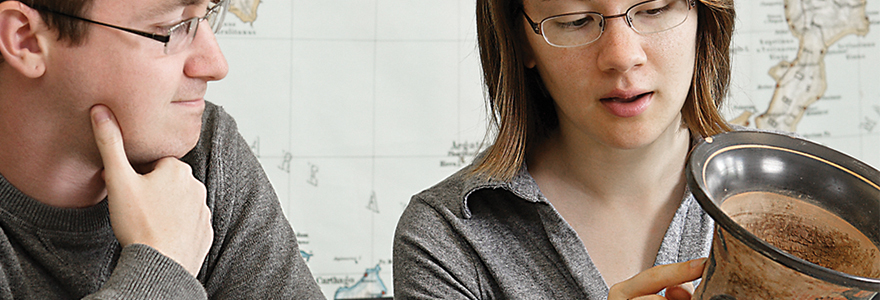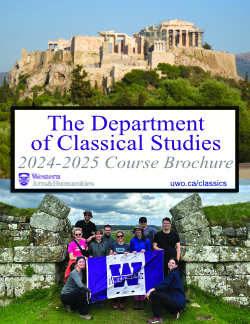Undergraduate
Questions?
Undergraduate Coordinator
Cindi Ryde
cryde@uwo.ca
Undergraduate Chair
Dr. Bernd Steinbock
bsteinbo@uwo.ca
Arts & Humanities
Academic Counselling
519-661-3043
arts@uwo.ca
Undergraduate
Why Study Classics?
Classical Studies at Western is broadly based on the study of the language and literature, history, and archaeology of the Greek and Roman world. The study of Classics is, by its nature, an interdisciplinary one, combining the main fields of Greek and Latin literature, history, and archaeology with other subjects such as religion, mythology, political theory, law, philosophy, sports, music, sexuality and gender studies.
Classical Studies is not just an exploration of ancient civilizations in the Mediterranean, but also an exploration of how Greece and Rome fundamentally shaped our own world and the way we think today.
Classical Studies Modules
With the present emphasis of students on choosing a university degree which they hope will lead directly to employment, why choose a liberal arts education such as Classical Studies?
Classical Studies in general helps to develop excellent skills in communication and problem solving, and has given a distinct advantage to our own graduates who have gone on to careers in journalism, computer programming, publishing, teaching, library science, museum studies, law and business administration.
Students planning to continue in the professional fields such as law and medicine find that Classical Studies establishes a solid background for professional study and sets them apart from others with good records but less diverse and ambitious programs.
The interdisciplinary nature of Classical Studies makes it an ideal combination for a double area of concentration with other fields in both the faculties of Arts and Social Sciences. Past and present students have combined Classical Studies with Anthropology, English, History, Comparative Literature and Civilization, Philosophy, and Visual Arts.
The Department of Classical Studies offers courses to students representative of the basic areas of inquiry into the ancient Greek and Roman world: language, literature, history, and archaeology. Courses are arranged in three categories, allowing students to consider aspects of the ancient world from different perspectives. The general courses (2000-level) offer broad overviews of selected subjects. The Honours courses (3000-level or higher) in Classical Studies provide the opportunity for students to pursue topics in greater depth. The courses in Greek and Latin allow direct access to ancient literature in the original languages.
The Department of Classical Studies presently offers the following modules as part of an undergraduate Bachelor of Arts degree:
- Honours Specialization in Classical Studies (9.0 specified courses)
- Specialization in Classical Studies (9.0 specified courses)
- Major in Classical Studies (6.0 specified courses)
- Minor (Classical Studies, Greek, Latin, Greek and Latin, Greek and Latin Literature, Greek and Roman Archaeology, Greek and Roman History) (4.0 specified courses)
-
View the 2024-2025 Course Brochure here
-
Please note: course offerings may be subject to change. As you plan your course selections, we encourage you to review the academic timetable regularly and follow updates available on the Office of the Registrar website.
-
For more information about any of the courses and/or programs offered by the Department of Classical Studies, please contact the Undergraduate Chair.






